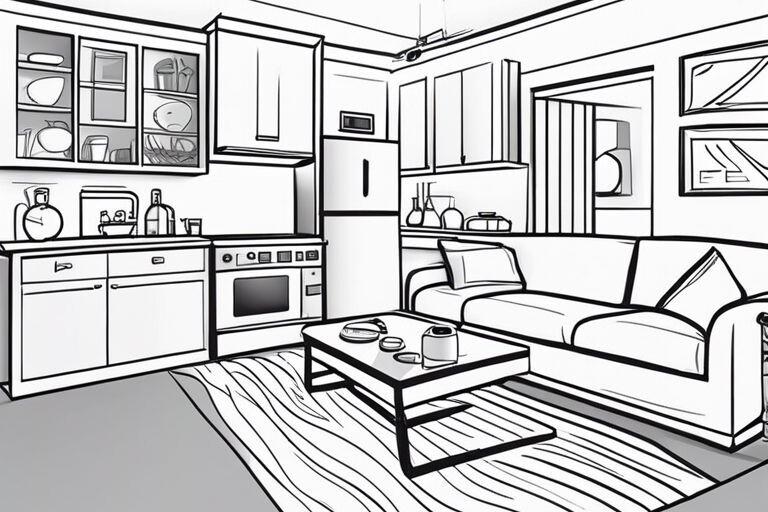As I cozy up by the fireplace on a chilly winter evening, I’m reminded that the warmth and comfort it brings also come with a heightened risk of fire. With the statistics showing that home fires are a leading cause of civilian deaths and injuries, I know I’m not alone in wanting to safeguard my household from the dangers of flames. In this article, I’ll share important tips on how to prevent home fires, from planning ahead and maintaining smoke alarms to closely monitoring stoves and grills and carefully operating fireplaces and space heaters. By following these simple yet effective tips, you can significantly reduce the risk of a fire occurring in your home and keep your loved ones safe.

Key Takeaways:
- Plan Ahead: Prepare for the worst by having a fire escape plan, keeping fire extinguishers accessible, and ensuring exits are clear.
- Maintain Smoke Alarms: Install smoke alarms on every level of your home, replace batteries twice a year, and regularly test them to ensure they work properly.
- Closely Monitor Heating Sources: Be cautious when using stoves, grills, fireplaces, wood stoves, and space heaters, and take steps to prevent fires from starting, such as keeping combustible objects away and not leaving them unattended.
The Risks of Home Fires
Before we examine the necessary tips for home fire prevention, it’s crucial to understand the risks associated with home fires. The statistics are alarming, and the characteristics of home fires are often misunderstood.
Statistics on Home Fires
An astonishing 330,000 home fires occurred in the United States last year, resulting in 2,850 civilian fire deaths and 11,172 injuries. These fires also caused nearly $13 billion in direct property damage. The numbers are staggering, and proactive measures are necessary to prevent home fires from occurring in the first place.
Characteristics of Home Fires
Home fire characteristics are often overlooked, but they’re critical to understanding the risks. Home fires are fast, hot, and dark, making them lethal and destructive. What starts as a small fire can quickly fill a house with smoke and flame, producing poisonous gases and making escape difficult.
With room temperatures reaching up to 600 degrees at eye level, injuries and deaths are often a result of the smoke rather than the fire’s heat. This is why it’s crucial to have a plan in place, maintain smoke alarms, and closely monitor stoves, grills, fireplaces, and space heaters. By understanding the characteristics of home fires, you can take the necessary steps to safeguard your household from flames.
Preparing for the Worst
There’s no denying that home fires can be devastating, but being prepared can make all the difference. By taking proactive steps, you can minimize the risk of fire and ensure your household’s safety in case of an emergency.
Creating an Escape Plan
A crucial part of preparing for the worst is creating an escape plan. This plan should identify at least two ways out of each room, designate a meeting spot outside the home, and establish a communication plan in case you get separated. Practice your escape plan twice a year to ensure everyone in your household knows what to do in case of a fire.
Maintaining Smoke Alarms
Creating a safe home environment starts with functional smoke alarms. According to the NFPA, nearly three out of five home fire deaths were caused by property fires with no smoke alarms or smoke alarms that failed to operate.
Understanding the importance of smoke alarms, it’s crucial to maintain them properly. Replace smoke alarm batteries twice yearly and regularly test alarms to ensure they’re in good operating order. This simple step can save lives and prevent devastating property damage.
Ensuring Clear Exits
Creating a clear path to safety is vital in case of a fire. Ensure exits from each room are clear, windows can be opened, and screens can be removed. If someone in the home has a disability, ensure all doorways can accommodate their wheelchair or walker.
Exits should be well-lit and free from clutter to ensure a safe and quick escape. Inspect your home’s exits and make any necessary adjustments to ensure your household’s safety.
Kitchen Safety
For many of us, the kitchen is the heart of our home, where we cook, socialize, and create memories with loved ones. However, it’s also a high-risk area for fires, with electrical appliances, open flames, and hot surfaces posing a significant threat to our safety.
Monitoring Stoves and Grills
One of the most critical steps in preventing kitchen fires is never leaving a stove or grill unattended. Whether you’re cooking on the stovetop, oven, or grill, make sure you’re always present to monitor the heat and flames. Keep a fire extinguisher nearby, and ensure that children and pets are kept at a safe distance from the cooking area.
Preventing Kitchen Fires
For me, the kitchen is a place where memories are made and meals are shared with loved ones. However, it’s important to remember that kitchen fires can be devastating, causing damage, injuries, and even loss of life. To prevent kitchen fires, always keep a close eye on your cooking, never leave cooking unattended, and keep flammable materials such as towels, curtains, and utensils away from heat sources.
The statistics are alarming – according to the National Fire Protection Association (NFPA), cooking equipment is the leading cause of home fires and fire injuries in the United States. In fact, nearly half of all home fires start in the kitchen, with electrical appliances, such as toasters and microwaves, being a significant contributor to these fires. By being vigilant and taking simple precautions, we can significantly reduce the risk of kitchen fires and keep our loved ones safe.
Fireplace and Space Heater Safety
Despite the cozy ambiance they provide, fireplaces and space heaters can be hazardous if not used properly. In fact, according to the American Red Cross, heating equipment is a leading cause of home fires during the winter months. To learn more about Home Fire Prevention & Safety Tips, I recommend checking out the American Red Cross website.
Operating Fireplaces and Woodstoves Safely
Any homeowner who uses a fireplace or woodstove should take extra precautions to ensure their safety. This includes having your chimney inspected and cleaned annually, keeping a fire screen in place to contain sparks, and never leaving a fire unattended or going to bed without extinguishing it first.
Using Space Heaters Wisely
For many of us, space heaters are a convenient way to warm up a chilly room. However, they can also be a fire hazard if not used correctly. Make sure to keep space heaters at least three feet away from combustible objects, never leave them unattended, and always follow the manufacturer’s instructions.
When choosing a space heater, look for one that has been evaluated by a nationally recognized laboratory, such as Underwriters Laboratories (UL), and has a thermostat control mechanism that switches off automatically if the heater falls over. Additionally, never use a space heater in a room with poor ventilation, as this can lead to a buildup of carbon monoxide.
Protecting Children from Fire
Take proactive steps to educate and protect your children from the dangers of fire. As a parent, it’s vital to prioritize their safety above all else.
Educating Children about Fire Safety
A vital aspect of protecting children from fire is educating them about its dangers. Teach your kids that fire is not a toy and should never be played with. Explain to them that fire can hurt people and damage property and that it’s crucial to stay away from it.
Keeping Matches and Lighters Out of Reach
Any opportunity for children to access matches or lighters can lead to a potential fire hazard. Ensure that these items are stored in a safe and secure location, out of children’s reach and sight.
Children are naturally curious from a young age, and it’s not uncommon for them to explore their surroundings. This curiosity can sometimes lead them to experiment with fire, which can have devastating consequences. By keeping matches and lighters out of reach, you’re significantly reducing the risk of a fire starting in your home.
After a Fire
Unlike the relief of escaping a fire unharmed, the aftermath can be overwhelming and stressful. As you deal with the emotional toll of the experience, you’ll also need to navigate the process of recovering your losses and rebuilding your life.
Here are some important steps to take after a fire:
Preparing an Insurance Claim
One of the most critical tasks after a fire is preparing your insurance claim. This can be a daunting and time-consuming process, especially when you’re trying to care for your family and recover from the trauma of the event. Consider hiring a public adjuster who can help document the damage to your property and account for your lost belongings.
Seeking Professional Help
On top of dealing with the emotional aftermath of a fire, you’ll also need to contend with the physical damage to your property. This is where professional help can be invaluable. From assessing the damage to navigating the insurance claims process, experts like public adjusters can take some of the burden off your shoulders.
Preparing your insurance claim requires meticulous attention to detail, from documenting the damage to your property to accounting for every lost item. A professional public adjuster can help you navigate this complex process, ensuring that you receive a fair and just settlement from your insurance company. With their expertise, you can focus on rebuilding your life and caring for your loved ones.
Final Words
Now that you’ve read through these crucial home fire prevention tips, I hope you’re better equipped to safeguard your household from the dangers of flames. Be mindful of, a little preparedness goes a long way in preventing home fires and limiting damage if they do occur. By following these simple yet effective tips, you’ll be able to enjoy the warmth and comfort of your home while keeping your loved ones safe. So, take the necessary steps today, and rest easy knowing you’ve done everything in your power to prevent a home fire from occurring.


